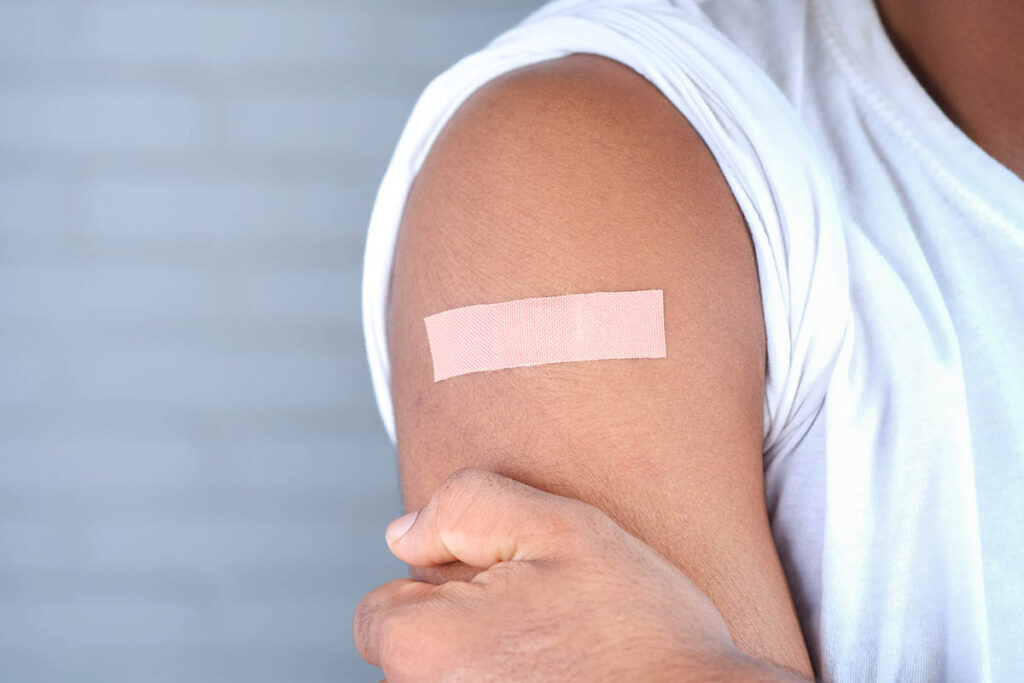I am 46 years old and until a few weeks ago I remained undecided about whether to take (or not) the COVID-19 vaccine. I was "in the decision-making process".
In Portugal, the vaccination procedure started on December 27, 2020. I was called in June. I used the need for a cardiology consultation as an excuse to postpone this decision. I was born with a small heart defect, nothing too serious, but enough to make me hesitate to deliberately subject my body to something unknown.
I found a courteous, conversational doctor (aren't we all in need of dialogue?), who demystified some conspiracy theories and explained to me the advantages of vaccination: the vaccine reduces the risk of contracting COVID-19 and allows us to protect us against the disease and its complications. A person with COVID-19 can either suffer a serious illness that can lead to death or be infected and not show any symptoms.
Once the disease is over, people may need physiotherapy to lift their legs, arms again, be able to sit unaided, walk, or even talk and swallow. Post-viral fatigue, damage to various organs, emergence of other viral infections, brain damage and mental health are some of the possible damages. And the question remains — what sequels might appear in the future?
That said, the benefit of vaccination seemed to me to be much greater than the risk.
Interestingly, the argument I find most in my circle of friends who refuse the vaccine is similar, but on a different spectrum: what are the long-term effects of the vaccine?
I won't mention the various conspiracy theories against vaccination, but I can say: so far, I haven't managed to get any coins stuck to my arm.
Taking the (legitimate) doubt of some people who fear vaccination based on ignorance: how will our body react to these messenger RNA vaccines (used in BioNTech/Pfizer and Moderna vaccines)?
And what is this about RNA?
Very simply, humans have DNA (DNA is a molecule whose main function is to store all the genetic information that makes up a living being, written with a combination of four letters: G, A, T, C), and viruses have RNA (RNA is a single strand with three of the same letters as DNA (G, A, C), and a U instead of a T. It's much more unstable and fragile, but on the other hand, it works for almost anything) .
These drugs provide the body with a kind of genetic code so cells can make viral proteins and get the body to respond with antibody viruses. In this way, the vaccinated individual is developing immunity against the virus.
Messenger RNA vaccines are a new type of immunizer to protect people from infectious diseases. Like ordinary vaccines, the purpose of messenger RNA is to create antibodies against a virus that threatens human health. However, instead of inserting the attenuated or inactive virus into an individual's body, this new immunizer teaches cells to synthesize a protein that stimulates the body's immune response.
Strange? Far ahead? Dear reader, Biomedical Science is advancing!
It's true: this is the first time that this type of vaccine has been used, but while there are still no licensed messenger RNA vaccines in Europe, researchers have been studying and working on this technology for decades. Gene therapy is the future.
It's true: the vaccines were made in record time, but no steps were skipped. Everything was accelerated, with several steps taking place at the same time: "Early and continuous dialogue between the pharmaceutical industry and a group of regulatory experts from the EMA was important to streamline the entire process".
We all fear the incognito, but it has been like this in these leaps into the unknown, that Humanity has advanced. Not always in the best direction — it's also true — but in the face of a pandemic emergency like the one we are currently experiencing, this was the path found. If it's the best, nobody knows, but we are together.
Faced with the question of what the long-term side effects of the vaccine might be—and why, if they exist, would they be negative? Why not think about positive side effects? And what we know, as it has already happened to people who contracted the virus, I opted for what is now more certain.
"The best way to prepare for the future is to focus all your imagination and enthusiasm on perfecting today's work."
Dale Carnegie
Sources you can consult to be more informed:
https://www.deco.proteste.pt/saude/doencas/noticias/vacinas-contra-covid-19-esclareca-duvidas
https://www.tsf.pt/portugal/sociedade/e-depois-da-covid-19-eventuais-sequelas-vao-desde-fadiga-a-danos-cerebrais-12928748.html
https://brasil.elpais.com/ciencia/2020-12-18/rna-a-molecula-que-pode-nos-tirar-desta-pandemia.html
https://www.ema.europa.eu/en/documents/overview/comirnaty-epar-medicine-overview_pt.pdf
https://www.ema.europa.eu/en/documents/overview/vaxzevria-previously-covid-19-vaccine-astrazeneca-epar-medicine-overview_pt.pdf




















Comments